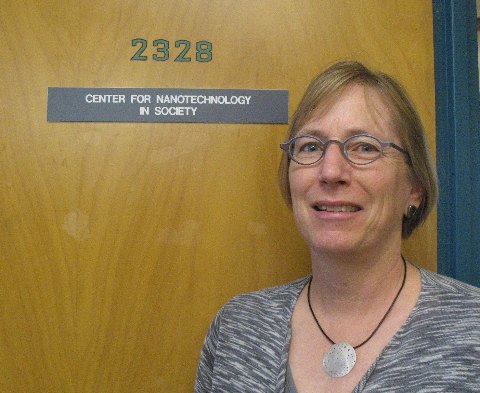$6 Million Grant to Fund Nanotechnology at UCSB
Five Year Renewal Grant from National Science Foundation for Campus Nanotech Center
UC Santa Barbara will receive almost $6.1 million over five years from the National Science Foundation (NSF) to extend support for the campus’s innovative Center for Nanotechnology in Society (CNS) through 2015. The grant represents an increase of almost 21 percent from the initial funding in 2005.
Founded in 2006, CNS is a Nanoscale Science and Engineering Center, and is the sole national center in the humanities and social sciences at UCSB. The Center has a threefold mission of strategic research, education, and outreach to a diverse range of stakeholders and policymakers on the societal implications of nanotechnology innovation and responsible development. A sister Center for Nanotechnology in Society at Arizona State University is also being renewed in the same cycle.
“This strongly interdisciplinary effort of CNS at UCSB brings together researchers from across the social sciences, cultural and technology studies, the natural sciences, and engineering, to address the societal implications of nanoscience and technology,” said Chancellor Henry T. Yang. “The Center builds on the internationally recognized strengths of UCSB and our eminent partners at other universities to create a new framework for studying nanotechnology in society.”

Barbara Herr Harthorn, an anthropologist and associate professor of feminist studies at UCSB, will continue as director of the center. In the Center for Nanotechnology in Society, Harthorn leads one of three linked research groups. She also leads a research group in the NSF- and EPA-funded University of California Center for Environmental Implications of Nanotechology at UCLA and UCSB. “I believe CNS researchers are contributing an essential new form of social science input to the nanoscale science and engineering and materials research community in our focus on the societal contexts for responsible development of nanotechnologies in vital application areas of energy, health, water, food, and environment,” Harthorn said.
Richard P. Appelbaum, MacArthur Chair and professor of sociology and global and international studies, W. Patrick McCray, professor of history, and Craig Hawker, professor of materials science and director of the Materials Research Laboratory, all at UCSB, will serve as co-principal investigators and executive committee members of CNS-UCSB in its next five years.
Harthorn’s research group, with lead collaborators at University of British Columbia (Canada) and Cardiff University (Wales, Britain) and at UCSB with Bruce Bimber, professor of political science, has developed a solid knowledge base about public, scientist, industry, and regulator perceptions of nanotech risk, shifting media coverage that influences such views, and modes of engaging diverse members of the public in dialogue about new technologies and society. The work ahead adds new collaborators at Lehigh University to expand CNS research on traditional and new social media framing of nano risks and at Decision Research to develop novel decision pathway survey research on emergent public views. Additional new directions include survey work on nano consumer products; renewed attention to regulatory challenges; gender and race in public participation; collective action; and collaboration with scientists to develop responsible risk communication in conditions of uncertainty.
Sociologist Appelbaum leads the Globalization and Nanotechnology group, researching nanoscale R&D and commercialization in China; national nanotechnology policy in Korea, Japan, and the U.S; and the role of multicountry collaborations in high- impact research and commercial innovation. Related projects with colleagues at Duke University entail a bibliometric study of publications and patents in Europe, North America, and Asia, and charting California nanotechnology in the global economy, using a global value chains framework. Chris Newfield, professor of English, will lead a cross-cutting initiative on nanotechnology for solar energy. In 2009, Appelbaum’s group co-hosted a conference on “Emerging Economies, Emerging Technologies: Prospects for Equitable Development,” at which leaders from all sectors and from developing countries convened to discuss technology-based solutions to problems in energy/environment, water, food security, and health.
McCray’s group has established the historical contexts of nanotechnology as a research field, a component of U.S. science policy, and an element in popular imaginings of future technologies. The group studies the history of nanoelectronics and the institutions and communities from which scientists, businesspeople, and policy makers have fashioned today’s nano-enterprise. New research considers policies for micro/nanoelectronics in the U.S. compared with those of other Pacific Rim nations; the nature of interdisciplinary research in American nanotech labs; and how federal research policies have impacted new areas of research that bridge the physical and life sciences.
UCSB nanoscale researchers agree that the CNS at UCSB has formed a novel education program at a time when education for science and technology has increasing prominence in the U.S. Under Julie Dillemuth, CNS education director, the center provides a unique interdisciplinary graduate fellowship program to students from the social sciences, humanities, and nanoscale science and engineering. From its inception in 2006, CNS has also partnered with the UCSB California NanoSystems Institute (CNSI) in providing summer research internships for undergraduate students and area community college students.
According to Hawker, “CNS has enriched the experience of the science interns by helping them learn about science in society – where their work goes when it leaves the lab, global value chains involved in the production of industry-specific technologies, obstacles to tech transfer, and organizational problems that could impede safe development.”
CNS-UCSB leverages its efforts by collaborating with researchers in numerous departments, centers, institutes, and schools across UCSB in all divisions of the College of Letters and Science, the Bren School of Environmental Science & Management, and the College of Engineering. Lead extramural collaborators include those at Chemical Heritage Foundation, Duke University, Rice University, SUNY Levin Institute, UCLA, and University of Wisconsin in the U.S.; Cardiff University in Britain; and University of British Columbia.
